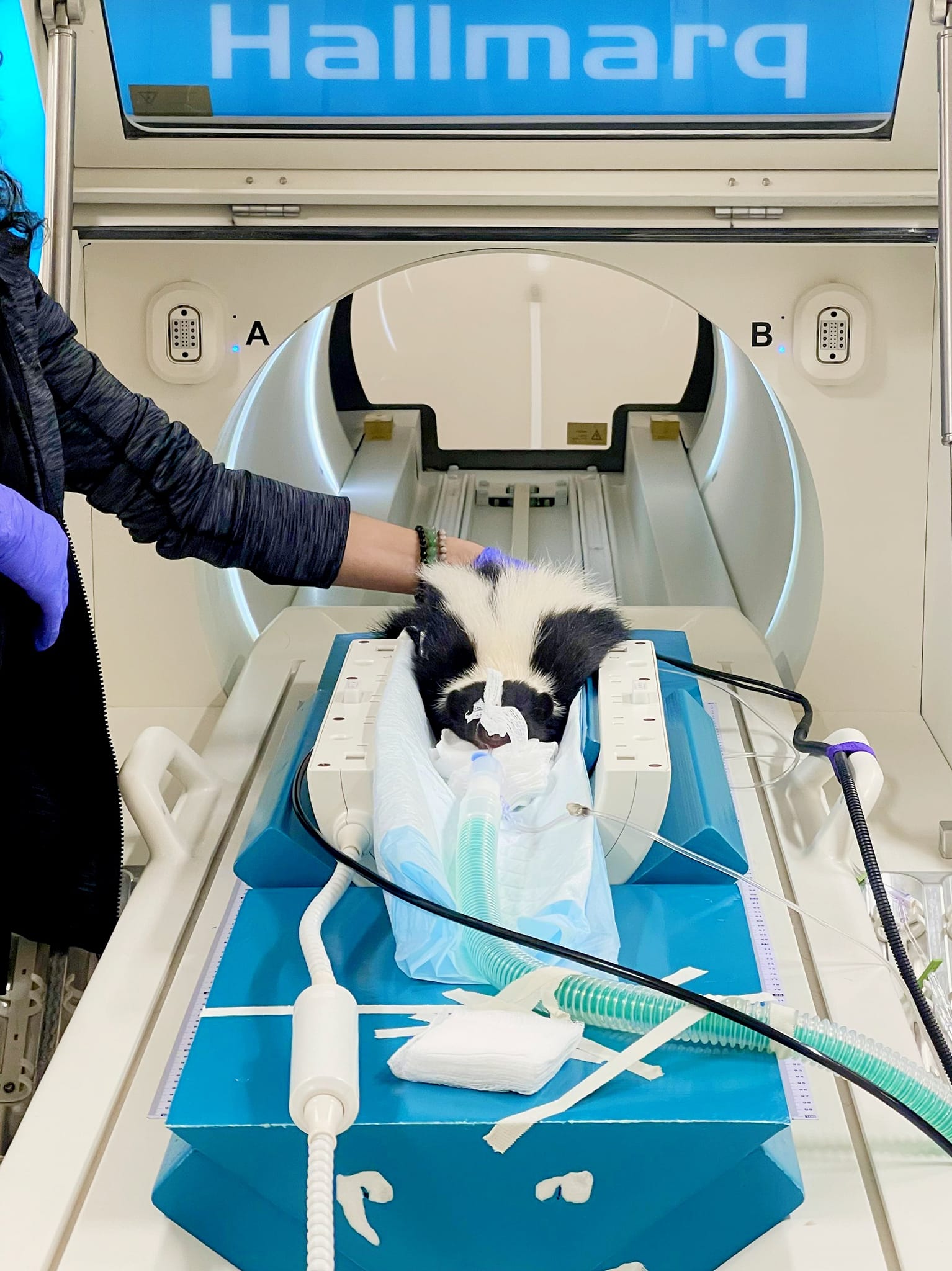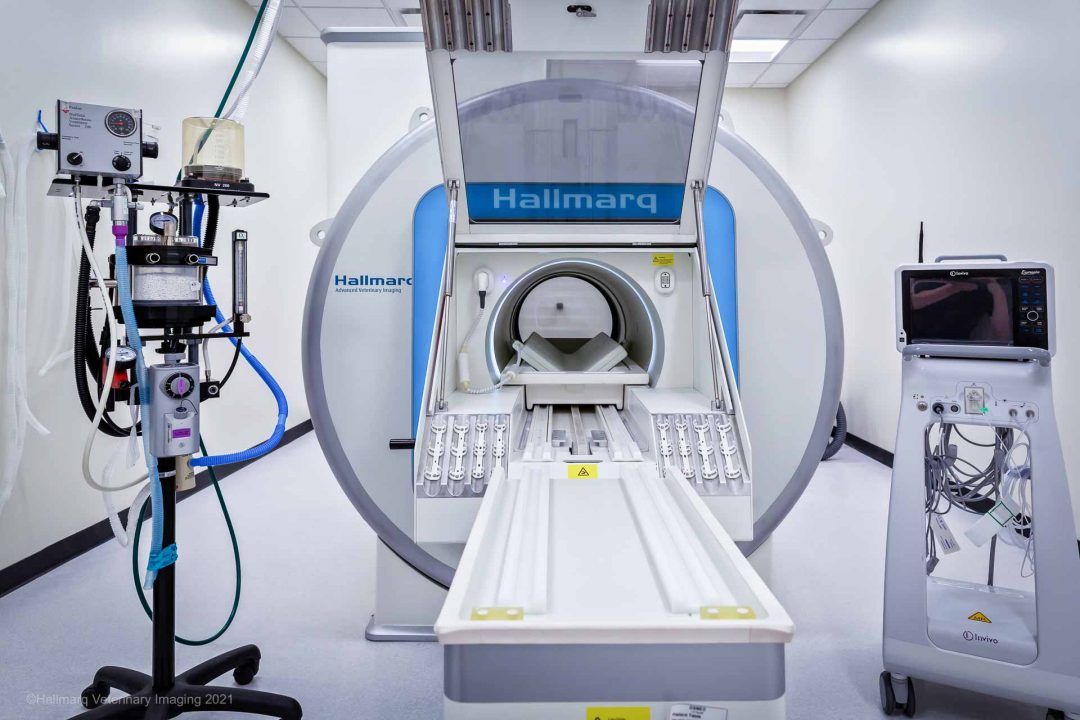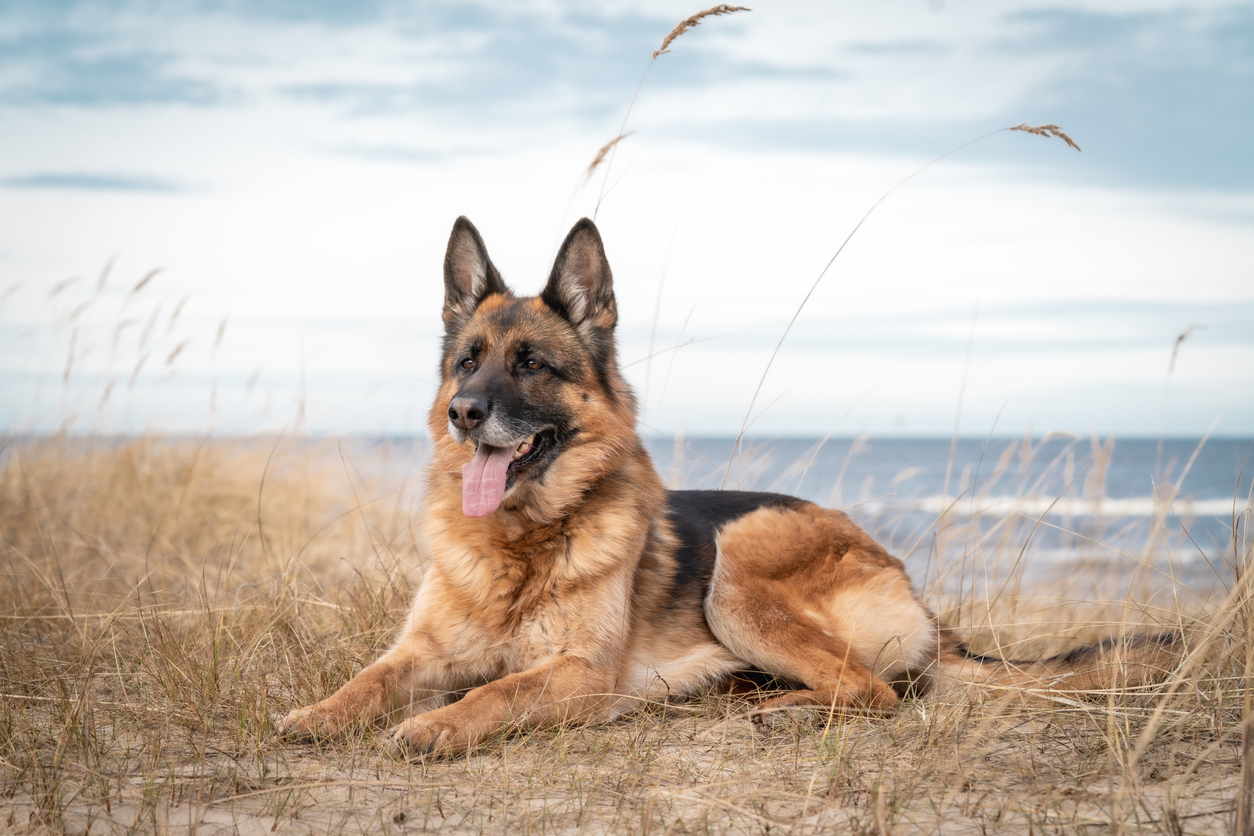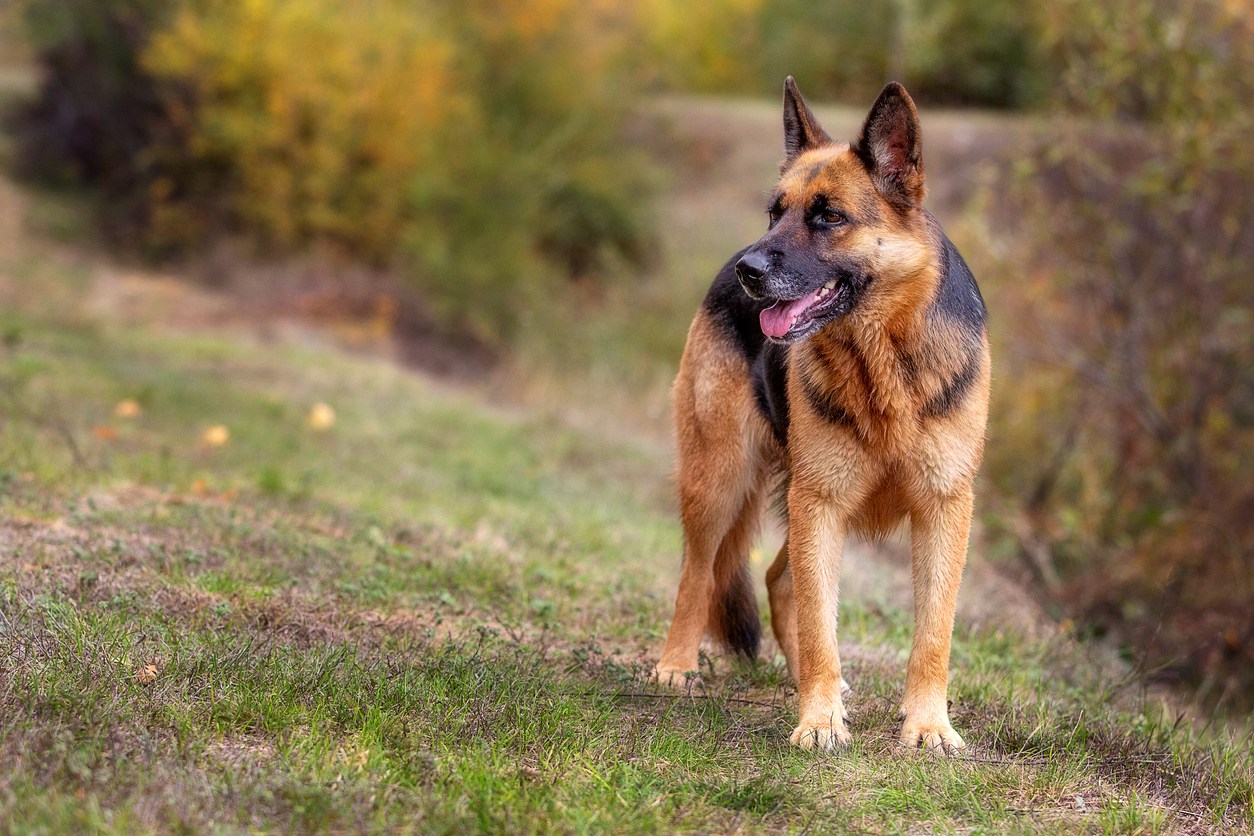Summary
When Dr. Cody Alcott first envisioned Tucson Veterinary Specialists (TVS), he imagined a place where expertise, technology, and compassion could intersect to elevate the standard of care for pets across southern Arizona. Today, that vision has taken root in a state-of-the-art hospital where advanced diagnostics – anchored by the Hallmarq 1.5T small animal MRI – combine with clinical research and collaboration to deliver best-in-class specialty care.
Precision in Practice:
When Dr. Cody Alcott first envisioned Tucson Veterinary Specialists (TVS), he imagined a place where expertise, technology, and compassion could intersect to elevate the standard of care for pets across southern Arizona. Today, that vision has taken root in a state-of-the-art hospital where advanced diagnostics – anchored by the Hallmarq 1.5T small animal MRI – combine with clinical research and collaboration to deliver best-in-class specialty care.
Built on Expertise, Backed by Research
Opened by Dr. Alcott in April 2021, TVS isn’t just another specialty clinic. It’s a referral center where patients with the most complex neurological, surgical, and internal medicine conditions are treated by a multidisciplinary team of board-certified specialists. At the center of its neurology service is Dr. Cody Alcott, one of the few veterinarians in the U.S. dual-boarded in both Neurology and Large Animal Internal Medicine.
Dr. Alcott’s experience is more than clinical however. He’s also a published researcher whose work has directly shaped how neurological conditions are treated in companion animals. Notably, he co-authored a 2020 [1] study on extended durotomy techniques for paraplegic dogs with intervertebral disc herniation – an area of surgical intervention that aligns closely with the types of cases seen at TVS. That surgical insight is now regularly paired with the practice’s MRI capabilities to drive faster, more confident treatment decisions.
The Game Changer: Veterinary-Specific MRI
Before installing the Hallmarq 1.5T high-field MRI, the neurology team often relied on CT or external referrals for imaging. This sometimes delayed the diagnostic process or limited the depth of what could be seen, particularly in subtle spinal cord or brain lesions.
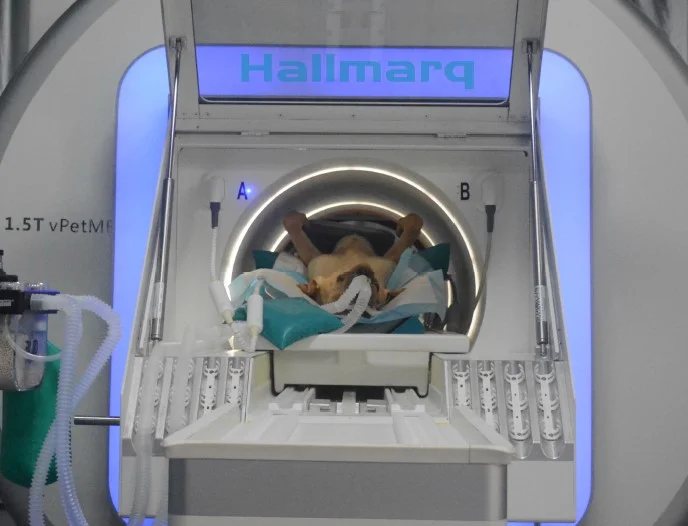
With the Hallmarq system in-house, everything changed. The veterinary-specific coils, high-field strength, and tailored imaging sequences give TVS the clarity needed to pinpoint neurologic abnormalities with surgical precision. In-house MRI enables the team to go from suspicion to diagnosis to treatment within a matter of hours, not days. For emergency cases, speed makes all the difference, especially for those patients suffering from progressive spinal cord compression or acute brain injuries as Dr Alcott explains:
I regularly review brain MRIs from other referral hospitals for second opinions. I’m very impressed with the quality of our Hallmarq MRI images relative to traditional used ex-human high-field MRIs. The clarity of our veterinary-specific images strengthens our confidence in central nervous system disease diagnosis.”
Dr Cody Alcott, DACVIM, Tuscon Veterinary Specialists, Tucson, AZ
1.5T MRI: Seeing What Others Miss
Tuscon’s MRI has been transformative in cases where other imaging modalities fell short. One memorable case involved a Dachshund with sudden-onset paraplegia. A previous CT scan at a different facility had failed to locate the problem. But, with their Hallmarq MRI a ruptured disc with significant spinal cord compression was revealed. With this diagnosis, Dr. Alcott and his team performed a minimally invasive decompression surgery, and within weeks the dog was walking again.
In another instance, a Golden Retriever was referred with vague neurological signs. The clinical images obtained with MRI clearly showed three areas of spinal compression along with an unexpected mass impinging on the chest wall. With this knowledge, the team formulated a coordinated surgical plan, giving the patient a much-improved quality of life.
The pattern is clear: 1.5T MRI enables deeper insight, earlier diagnosis, and better outcomes.
Tackling Regional Challenges
Based in the Southwest means that TVS also sees cases of Valley Fever (coccidioidomycosis): a fungal disease that can affect the brain and spinal cord. Recognising a gap in current diagnostic tools, Dr. Alcott has teamed up with infectious disease specialists to investigate cerebrospinal fluid biomarkers that could help detect neurological forms of Valley Fever earlier and more accurately [2]. This ongoing research not only serves local pet populations but further illustrates how the team is committed to addressing regional health challenges through evidence-based research.
When combined with the precise imaging capabilities that Hallmarq’s MRI can deliver, this research strengthens TVS’s ability to provide accurate, timely care for conditions that are often underdiagnosed or misidentified.
A Partner to the Veterinary Community
With in-house MRI, rapid diagnostics, and a team dedicated to collaboration, TVS has become a trusted referral partner for general practice veterinarians across Arizona and beyond. From teleconsulting to seamless intake, their process is designed to support both referring vets and pet families, with clarity and compassion.

A Model for Modern Veterinary Medicine
As Dr. Alcott continues to expand both the practice’s capabilities and its clinical research portfolio, TVS is setting a high standard for what specialty veterinary medicine can offer. Key to future growth is growing the team; The practice has recently taken on neurologist Casey Birkel, DVM, Diplomate of the American College of Veterinary Internal Medicine – Neurology who, in her words, sums up her work:
In my humble opinion, nothing is cooler than the brain!”
Casey Birkel, DVM, Diplomate of the American College of Veterinary Internal Medicine – Neurology
With a dedicated team of specialists – and the Hallmarq 1.5T MRI proving so much more than just a tool to aid diagnosis – the practice can continue its mission to see more clearly, treat more effectively, and bring world-class care to the animals who need it most.
To get in touch with Tucson Vet Specialists, click here >>
References
- [1] Jeffery, N.D., Mankin, J.M., Ito, D., Boudreau, C.E., Kerwin, S.C., Levine, J.M., Krasnow, M.S., Andruzzi, M.N. and Alcott, C.J., 2020. Extended durotomy to treat severe spinal cord injury after acute thoracolumbar disc herniation in dogs. Veterinary Surgery, 49(5), pp.884–893. https://doi.org/10.1111/vsu.13384
- [2] Butkiewicz, C.D., Alcott, C.J., Renschler, J. and Wheat, L.J., 2021. The utility of Coccidioides antigen and antibody detection in cerebrospinal fluid in the diagnosis of canine central nervous system coccidioidomycosis. American Journal of Veterinary Research, 83(1), pp.59–63. https://doi.org/10.2460/ajvr.83.1.59
Summary
When Dr. Cody Alcott first envisioned Tucson Veterinary Specialists (TVS), he imagined a place where expertise, technology, and compassion could intersect to elevate the standard of care for pets across southern Arizona. Today, that vision has taken root in a state-of-the-art hospital where advanced diagnostics – anchored by the Hallmarq 1.5T small animal MRI – combine with clinical research and collaboration to deliver best-in-class specialty care.
